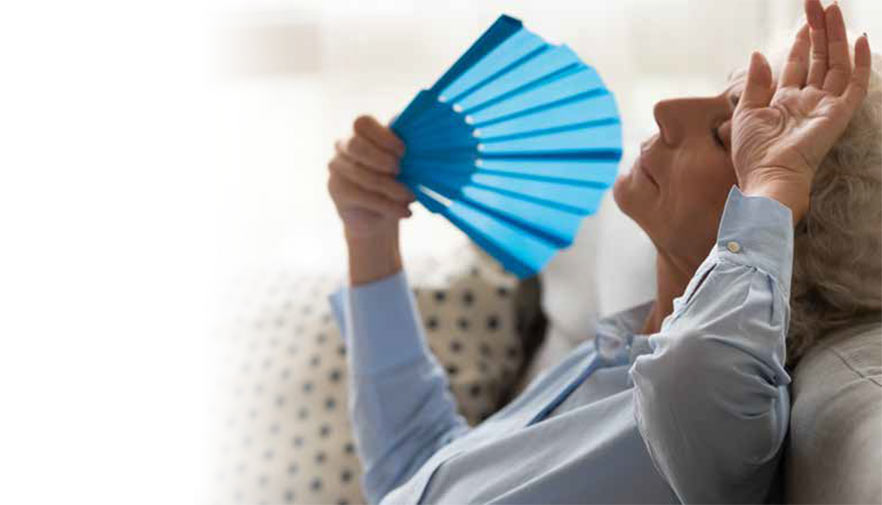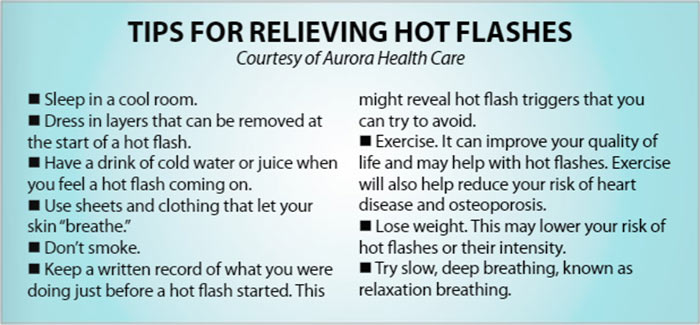
Slowly it builds until that faint warming sensation becomes a sizzle, often at a most inopportune time – a meeting, a special event – and you are awash with an unwelcome red glow. Then, as quickly as it came over you, you find yourself freezing in front of the pocket fan you just called your best friend. The guessing game begins: when will the next one occur? For most, there rarely seems a pattern or predictability to this condition we know as hot flashes.
When I asked a few known sufferers to give me one word that sums up their experience, they offered up descriptives such as aggravating, miserable, frustrating and, of course, sweaty.
Hot flashes generally occur in the upper body and are often coupled with their evil sister, night sweats. The average age for onset is reported as 52, but some much younger women with hormone-related or other medical conditions experience hot flashes as well. While the frequency varies, most women who experience hot flashes have them daily, with the span averaging seven years, and some sufferers reporting the experience lasting over a decade. They can be so severe that they become unmanageable, affecting work and other daily activities, while the night sweats can be so intense that they cause ongoing sleep disturbances.
THE MAYO CLINIC OFFERS THE FOLLOWING SYMPTOM CHECKLIST:
- A sudden feeling of warmth spreading through your chest, neck and face
- A flushed appearance with red, blotchy skin
- Rapid heartbeat
- Perspiration, mostly on your upper body
- A chilled feeling as the hot flash subsides
While hot flashes are not only a women’s issue — some male cancer patients undergoing treatments also have reported the unpleasant experience — for purposes of this article, we will touch on some options for the 75% of women who experience this unwanted rite of passage. And for the 25% of you who will dance through “the change” unscathed, count your blessings!
Note: None of the following is intended to diagnose or treat a condition, and all options should be discussed with your physician to determine the appropriate course for your particular situation.
DIET AND EXERCISE
As with all healthy living suggestions, it begins with our diet and exercise habits. A healthy diet with limited alcohol, sugar and caffeine has been found to be effective in curbing flash activity. Exercise has its own benefits, and sufferers report reduced episodes with increased exercise levels. So go for a brisk walk and get your heart rate up – you can get your steps in and maybe have fewer flashes too.
HOLISTIC
Acupuncture and other holistic offerings have had reported success, but, as with all remedies, reviews can be mixed as to efficacy. There are so many herbal remedies on the market, you must read the labels and consult your physician or holistic practitioner. Dr. Julie Allison, Charleston’s only acupuncturist with a Doctor of Acupuncture and Oriental Medicine, stated, “Traditional Chinese Medicine (TCM) which includes acupuncture and Chinese herbal formulas, can be very effective in treating menopause and perimenopause symptoms because we focus on treating the whole body. Menopause is classified as yin deficiency in Traditional Chinese Medicine, however there are often other underlying patterns that contribute to the severity of a woman’s symptoms. By doing a thorough intake and prescribing the appropriate acupuncture protocol and herbal formulae, as well as implementing any necessary nutritional and/ or lifestyle changes, I’ve seen many women experience profound relief from TCM treatment.”
Meditation and hypnosis might not typically be on your radar, but there is merit to their support. Quieting one’s brain and spirit can lead to a calmer outlook and reduced anxiety, thereby diminishing the physical effects hot flashes produce when the sufferer is under stress. Board Certified Hypnotist Dee Romanek shared, “The practice of hypnotherapy is most effective when customized to the individual client, making it more art than science. Science has actually studied the efficacy of hypnotherapy for menopausal hot flashes. Dr. Gary Elkins and his team are among those who have studied the use of personalized hypnotic relaxation therapy for hot flashes. Participants who received a series of individual hypnotherapy sessions, combined with instruction in self-hypnosis, reported a dramatic reduction in both the frequency and intensity of their symptoms. Broadly speaking, hypnotherapy is a gentle, natural and effective form of self-healing that beautifully complements traditional medical and mental health treatments, particularly, when pharmaceuticals are not recommended.”
PHARMACOLOGICAL – HORMONES
While the easy answer is always to “take a pill,” many women have no desire to begin a potentially multi-year course of hormone replacement therapy. For some, it may be their only relief, but for those who can explore other options, there are medical practices where patients can receive bioidentical hormones that are created specifically for each individual based on their own imbalances and other physical needs. This can be an excellent option for those who have dealt with extreme flashes for an extended period of time and where other remedies have failed.
Should you become a member of the hot flash “tribe,” know that you are not alone. Finding the right product or methodology – or combination of both – is key, but also know that this, too, shall pass — it just may take a while.
